英语常考知识点
英语高考常考知识点总结大全
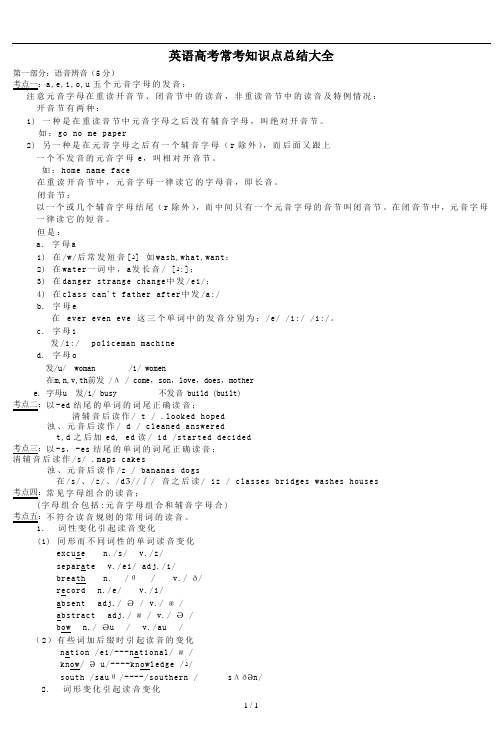
英语高考常考知识点总结大全第一部分:语音辨音(5分)考点一:a,e,i,o,u五个元音字母的发音:注意元音字母在重读开音节、闭音节中的读音,非重读音节中的读音及特例情况:开音节有两种:1) 一种是在重读音节中元音字母之后没有辅音字母,叫绝对开音节。
如:go no me paper2) 另一种是在元音字母之后有一个辅音字母(r除外),而后面又跟上一个不发音的元音字母e,叫相对开音节。
如:home name face在重读开音节中,元音字母一律读它的字母音,即长音。
闭音节:以一个或几个辅音字母结尾(r除外),而中间只有一个元音字母的音节叫闭音节。
在闭音节中,元音字母一律读它的短音。
但是:a. 字母a1) 在/w/后常发短音[ﺪ] 如wash,what,want;2) 在water一词中,a发长音/ [ﺪ:];3) 在danger strange change中发/ei/;4) 在class can't father after中发/a:/b. 字母e在ever even eve 这三个单词中的发音分别为:/e/ /i:/ /i:/。
c. 字母i发/i:/ policeman machined. 字母o发/u/ woman /i/ women在m,n,v,th前发 /Λ / come,son,love,does,mothere. 字母u 发/i/ busy 不发音 build (built)考点二:以-ed结尾的单词的词尾正确读音;清辅音后读作/ t / .looked hoped浊、元音后读作/ d / cleaned answeredt,d之后加ed, ed读/ id /started decided考点三:以-s,-es结尾的单词的词尾正确读音;后读作/s/ .maps cakes浊、元音后读作/z / bananas dogs在/s/、/z/、/dƷ//∫/音之后读/ iz / classes bridges washes houses考点四:常见字母组合的读音;(字母组合包括:元音字母组合和辅音字母合)考点五:不符合读音规则的常用词的读音。
初中英语必考知识点大全
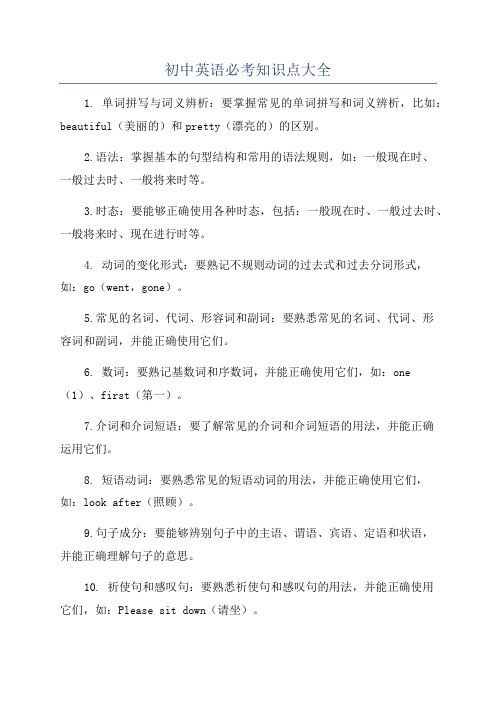
初中英语必考知识点大全1. 单词拼写与词义辨析:要掌握常见的单词拼写和词义辨析,比如:beautiful(美丽的)和pretty(漂亮的)的区别。
2.语法:掌握基本的句型结构和常用的语法规则,如:一般现在时、一般过去时、一般将来时等。
3.时态:要能够正确使用各种时态,包括:一般现在时、一般过去时、一般将来时、现在进行时等。
4. 动词的变化形式:要熟记不规则动词的过去式和过去分词形式,如:go(went,gone)。
5.常见的名词、代词、形容词和副词:要熟悉常见的名词、代词、形容词和副词,并能正确使用它们。
6. 数词:要熟记基数词和序数词,并能正确使用它们,如:one (1)、first(第一)。
7.介词和介词短语:要了解常见的介词和介词短语的用法,并能正确运用它们。
8. 短语动词:要熟悉常见的短语动词的用法,并能正确使用它们,如:look after(照顾)。
9.句子成分:要能够辨别句子中的主语、谓语、宾语、定语和状语,并能正确理解句子的意思。
10. 祈使句和感叹句:要熟悉祈使句和感叹句的用法,并能正确使用它们,如:Please sit down(请坐)。
11. 从句:要熟悉主从复合句的用法,并能正确使用它们,如:I know that she is a student(我知道她是一个学生)。
12. 并列连词:要了解常见的并列连词的用法,并能正确使用它们,如:and(和)、but(但是)。
13. 形容词和副词的比较级和最高级:要能够正确使用形容词和副词的比较级和最高级形式,如:big(大)、bigger(更大)。
14. 疑问句:要能够正确构造疑问句,并能用正确的语调进行发音,如:Where are you going?(你去哪里?)。
15. 冠词:要了解冠词的用法,并能正确使用它们,如:a、an、the。
16. 数量词:要了解数量词的用法,并能正确使用它们,如:some、any、much、many等。
超详细的小升初英语必考知识点大全
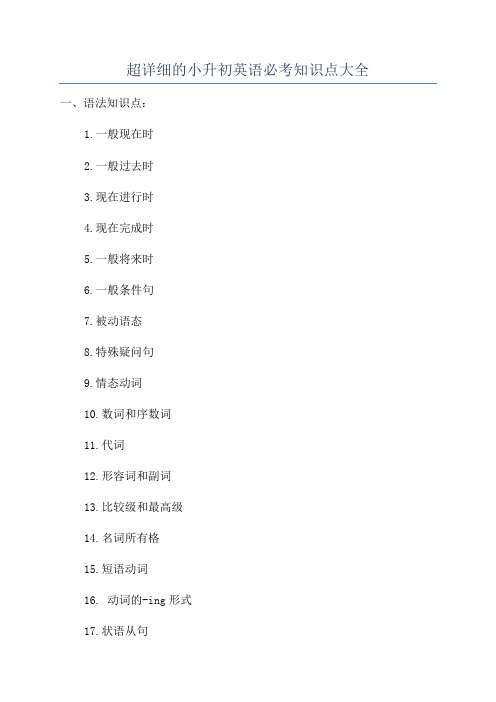
超详细的小升初英语必考知识点大全
一、语法知识点:
1.一般现在时
2.一般过去时
3.现在进行时
4.现在完成时
5.一般将来时
6.一般条件句
7.被动语态
8.特殊疑问句
9.情态动词
10.数词和序数词
11.代词
12.形容词和副词
13.比较级和最高级
14.名词所有格
15.短语动词
16. 动词的-ing形式
17.状语从句
18.定语从句
19.主语从句
20.句型转换
二、词汇知识点:
1.人称代词
2.物主代词
3.反身代词
4.不定代词
5.疑问代词
6.形容词及副词比较级和最高级
7.数词
8.时间和日期
9.季节和天气
10.节日及庆祝活动
11.学科和科目
12.动物和昆虫
13.植物和花草
14.食物和饮品
15.学校设施和教室用品
16.图书馆和书店常用词汇
17.上学和课堂常用表达
18.家庭成员和家居用品
19.交通工具和方向词汇
20.店铺和购物常用词汇
三、阅读理解常考知识点:
1.标题理解
2.主旨理解
3.细节理解
4.推理推断
5.比较与对比
6.逻辑关系
7.词义猜测
8.文字识别
四、写作技巧及常用句型:
1.写人物介绍
2.描述动物
3.介绍家乡
4.描述一天的活动
5.书信写作
6.作文开头和结尾句型
7.表达喜欢和不喜欢的句子
8.给出建议和意见的句子
9.时间、地点、原因、结果和目的的句子
10.介绍节日和庆祝活动的句子。
初中英语常考知识点

初中英语常考知识点以下是初中英语常考知识点,包括语法、词汇、阅读和写作等方面。
一、基础语法知识1.时态:包括一般现在时、一般过去时、一般将来时等。
2.语态:包括主动语态和被动语态。
3.名词:包括可数名词和不可数名词的使用。
4.代词:包括人称代词、物主代词、指示代词和不定代词的用法。
5.形容词和副词:包括形容词和副词比较级和最高级的用法。
6.介词:包括常见介词的用法和固定搭配。
7.状语从句:包括时间状语从句、原因状语从句、结果状语从句和条件状语从句等。
二、词汇知识1. 同义词和近义词:要求掌握一些常用的同义词和近义词,例如:big和large,happy和glad等。
2. 反义词:要求掌握一些常用的反义词,例如:hot和cold,fast 和slow等。
3. 词性转换:包括名词、动词、形容词和副词之间的转换,例如:teach(动词)- teacher(名词)- teaching(名词)- teachable(形容词)- teachably(副词)。
5. 常用固定搭配:要求掌握一些常用的固定搭配,例如:take care of,look forward to等。
三、阅读技巧1.主旨大意题:要求根据文章的内容确定主旨大意。
2.细节理解题:要求从文章中找出具体的细节信息。
3.推理判断题:要求根据文章中的信息进行推理判断。
4.词义猜测题:要求根据上下文推测生词的词义。
5.标题选择题:要求根据文章的内容选择合适的标题。
四、写作技巧1.书信写作:包括写作介绍信、道歉信、邀请信等。
2.作文写作:要求写出一篇简单明了、逻辑清晰、语言流畅的作文。
3.句式多样化:要求使用不同的句式表达不同的意思,避免句子过长和句子结构单一以上是初中英语常考知识点的概述,希望能够帮助大家更好地准备初中英语考试。
请大家在备考过程中多多练习,提高自己的英语能力。
中考英语常考的50个语法知识点

中考英语常考的50个语法知识点1. 一般现在时:表示现在的普遍状况或习惯性动作,如:He often goes to school by bike.2. 一般过去时:表示过去发生的动作或存在的状态,如:He went to school by bus yesterday.3. 一般将来时:表示将来发生的动作或存在的状态,如:He will go to school by car tomorrow.4. 现在完成时:表示从过去其中一时间延续到现在为止的动作或状态,如:He has gone to school by train for three years.5. 现在进行时:表示正在进行的动作,如:He is going to school by subway now.6. 过去将来时:表示过去将来发生的动作或存在的状态,如:He was going to go to school by bus the next day.7. 一般疑问句:用一般疑问句来询问,如:Do you go to school by bike?8. 特殊疑问句:用特殊疑问句来询问,如:What did he go to school by yesterday?9. 肯定句:用肯定句表达事实,如:He goes to school by car.10. 否定句:用否定句表达事实,如:He doesn't go to school by bike.11. 祈使句:用祈使句表达请求或命令,如:Go to school by subway.12. 动词的一般式:表示一般的动作或状态,如:He goes to school by bus.13. 动词的原形:表示基本的动作,如:He go to school by train.14. 动词的现在分词:表示正在进行的动作,如:He is going to school by bike.15. 动词的过去分词:表示过去发生的动作,如:He went to school by car.16. 动词的第三人称单数形式:表示人的动作或状态,如:He goes to school by bike.17. 不定式:表示未完成的动作,如:He wanted to go to school by bus.18. 名词的复数形式:表示多个名词,如:Those buses are going to school.。
高考常考英语语法知识点总结归纳

高考常考英语语法知识点总结归纳一、主谓一致主谓一致是英语语法中的基本知识点,常常考察于高考中。
在句子中,主语和谓语动词需要在人称和数上保持一致。
例句:1. My brother is a doctor.(我的兄弟是一名医生。
)2. The students are playing basketball.(学生们正在打篮球。
)二、时态时态是表示动作发生的时间的一种语法形式。
掌握时态的正确用法,能够使句子表达更加准确,避免时态错误。
1. 一般现在时(Simple Present Tense)一般现在时表示经常性或普遍性的动作或状态。
例句:1. They usually go to school by bus.(他们通常乘公共汽车去上学。
)2. Water boils at 100 degrees Celsius.(水在100摄氏度时沸腾。
)2. 现在进行时(Present Continuous Tense)现在进行时表示正在进行的动作。
例句:1. I am studying for the exam.(我正在为考试学习。
)2. She is watching TV right now.(她正在看电视。
)3. 过去时态(Past Tense)过去时态表示过去某个时间发生的动作或存在的状态。
例句:1. We visited the Great Wall last week.(我们上周参观了长城。
)2. He worked in that company for three years.(他在那家公司工作了三年。
)三、从句的引导词从句是一个可以独立存在的句子,它通常包含一个主语和谓语。
从句根据其功能可以分为名词性从句、形容词性从句和副词性从句。
1. 名词性从句名词性从句在句子中充当名词的角色,可以作主语、宾语、表语、同位语等。
例句:1. What he said is true.(他所说的是真的。
)2. I don't know where he is.(我不知道他在哪里。
常考英语知识点总结归纳

常考英语知识点总结归纳一、时态1. 一般现在时:表示经常性的动作或习惯,或者真理、规律等。
例:Cats like to chase mice.2. 现在进行时:表示正在进行的动作。
例:She is watching a movie right now.3. 一般过去时:表示过去发生的动作或状态。
例:They visited Europe last year.4. 过去进行时:表示过去某一时间段内正在进行的动作。
例:I was studying when my friend called me.5. 现在完成时:表示过去发生的动作对现在造成的影响或结果。
例:I have finished my homework.6. 过去完成时:表示过去某一时间点前已经完成的动作。
例:She had already left when I arrived.二、语法1. 名词- 可数名词:表示可以用数目表示的事物,可以加上冠词或数词定量。
例:a book, three houses- 不可数名词:表示无法用数目表示的事物,不能加数词定量。
例:water, advice2. 代词- 人称代词:用来代替特定的人或人群。
例:I, you, he, she, they- 反身代词:表示动作的承受者与动作的发出者是同一个人。
例:myself, yourself- 指示代词:用来指代特定的人或物。
例:this, that, these, those3. 形容词- 描述名词的性质、特征或状态。
例:beautiful, happy, tall- 可以形容名词的数量、大小或程度。
例:two, big, very4. 动词- 及物动词:需要接受动作的对象才能完整意义的动词。
例:eat, write- 不及物动词:独立存在,不需要接受动作的对象。
例:run, sleep- 助动词:用来帮助构成时态、语态和情态的动词。
例:be, have, do- 情态动词:用来表示说话者对动作或状态的态度、推测或能力等。
英语高考必考知识点
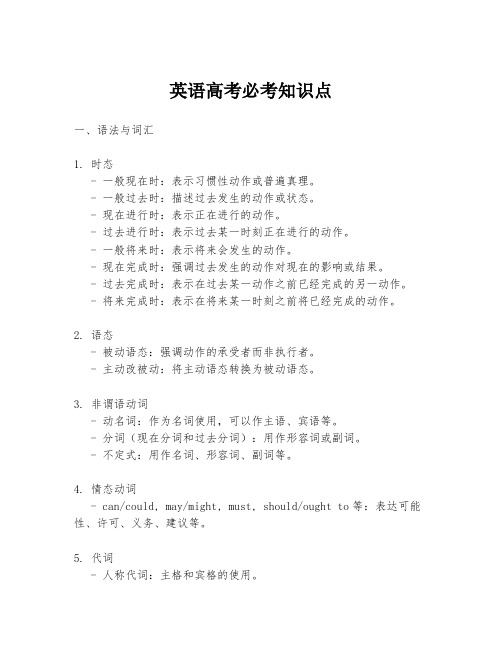
英语高考必考知识点一、语法与词汇1. 时态- 一般现在时:表示习惯性动作或普遍真理。
- 一般过去时:描述过去发生的动作或状态。
- 现在进行时:表示正在进行的动作。
- 过去进行时:表示过去某一时刻正在进行的动作。
- 一般将来时:表示将来会发生的动作。
- 现在完成时:强调过去发生的动作对现在的影响或结果。
- 过去完成时:表示在过去某一动作之前已经完成的另一动作。
- 将来完成时:表示在将来某一时刻之前将已经完成的动作。
2. 语态- 被动语态:强调动作的承受者而非执行者。
- 主动改被动:将主动语态转换为被动语态。
3. 非谓语动词- 动名词:作为名词使用,可以作主语、宾语等。
- 分词(现在分词和过去分词):用作形容词或副词。
- 不定式:用作名词、形容词、副词等。
4. 情态动词- can/could, may/might, must, should/ought to等:表达可能性、许可、义务、建议等。
5. 代词- 人称代词:主格和宾格的使用。
- 物主代词:形容词性物主代词和名词性物主代词。
- 反身代词、指示代词、疑问代词等。
6. 冠词- 不定冠词(a/an)和定冠词(the)的使用。
7. 介词- 常用介词的用法,如at, in, on, for, with, by, etc.8. 连词- 并列连词:and, but, or, so等。
- 从属连词:because, since, although, if, when, etc.9. 句子结构- 简单句、复合句和复杂句的构成。
- 陈述句、疑问句、祈使句和感叹句。
10. 词汇- 常用词汇的记忆和理解。
- 同义词、反义词、短语动词等。
二、阅读理解1. 快速阅读- 快速获取文章大意和主旨。
- 通过标题、首段、尾段和段落首句快速把握文章结构。
2. 细节理解- 理解文章中的具体信息和细节。
- 通过上下文推断生词或难句的含义。
3. 推理判断- 根据文章内容进行逻辑推理。
中考英语常考的语法知识点
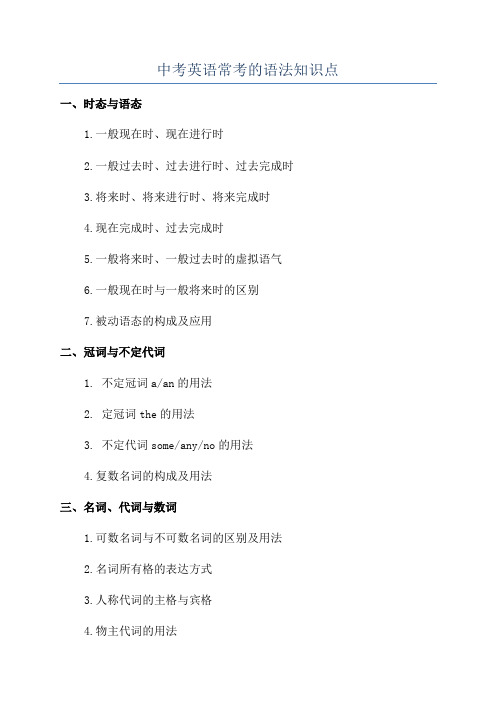
中考英语常考的语法知识点一、时态与语态1.一般现在时、现在进行时2.一般过去时、过去进行时、过去完成时3.将来时、将来进行时、将来完成时4.现在完成时、过去完成时5.一般将来时、一般过去时的虚拟语气6.一般现在时与一般将来时的区别7.被动语态的构成及应用二、冠词与不定代词1. 不定冠词a/an的用法2. 定冠词the的用法3. 不定代词some/any/no的用法4.复数名词的构成及用法三、名词、代词与数词1.可数名词与不可数名词的区别及用法2.名词所有格的表达方式3.人称代词的主格与宾格4.物主代词的用法5.反身代词的用法6. 不定代词some/any/no的用法7.句子中数词的表达方式四、形容词和副词1.基本形容词的用法2.形容词的比较级与最高级形式3.副词的构成方式4.副词的位置与用法5.形容词与副词的比较五、介词和连词1.常见介词的用法2.介词的位置与用法3.连词的分类与用法4.从句中连词的使用六、动词和动词短语1.动词的基本形式、过去式、过去分词等的构成规则2.动词的非谓语形式(不定式、动名词、现在分词)的构成及用法3.动词的时态与语态(如一般现在时、一般过去时、将来时等)的表达方式4.动词的时态和语态的转换5.动词短语(如动词加副词等)的用法七、形容词从句和副词从句1.形容词从句的引导词和从句的位置2.形容词从句的功能和特点3.副词从句的引导词和从句的位置4.副词从句的功能和特点八、主谓一致与倒装句1.单数主语与单数谓语动词的搭配方式2.复数主语与复数谓语动词的搭配方式3.主语与谓语动词之间的关系4.部分倒装句的构成方式和用法5.倒装句的时间表达方式九、陈述句、命令句、疑问句和感叹句1.陈述句的构成方式和用法2.命令句的构成方式和用法3.一般疑问句的构成方式和用法4.特殊疑问句的构成方式和用法5.否定句的构成方式和用法6.祈使句的构成方式和用法7.感叹句的构成方式和用法十、强调句和感情句1.强调句的构成方式和用法2.感情句的构成方式和用法以上是中考英语常考的语法知识点,通过熟练掌握这些知识点,可以提高语法的应用能力,从而在中考英语考试中获得更好的成绩。
高考英语常考的50个核心知识点
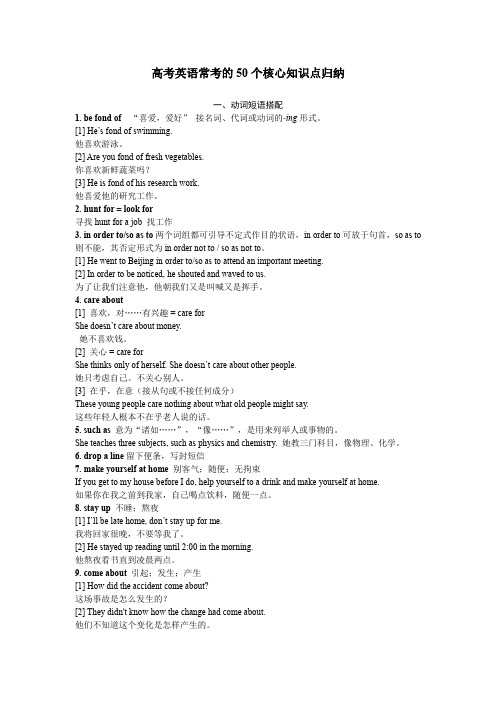
高考英语常考的50个核心知识点归纳一、动词短语搭配1. be fond of “喜爱,爱好”接名词、代词或动词的-ing形式。
[1] He’s fond of swimming.他喜欢游泳。
[2] Are you fond of fresh vegetables.你喜欢新鲜蔬菜吗?[3] He is fond of his research work.他喜爱他的研究工作。
2. hunt for = look for寻找hunt for a job 找工作3. in order to/so as to两个词组都可引导不定式作目的状语,in order to可放于句首,so as to 则不能,其否定形式为in order not to / so as not to。
[1] He went to Beijing in order to/so as to attend an important meeting.[2] In order to be noticed, he shouted and waved to us.为了让我们注意他,他朝我们又是叫喊又是挥手。
4. care about[1] 喜欢,对……有兴趣= care forShe doesn’t care about money.她不喜欢钱。
[2] 关心= care forShe thinks only of herself. She doesn’t care about other people.她只考虑自己。
不关心别人。
[3] 在乎,在意(接从句或不接任何成分)These young people care nothing about what old people might say.这些年轻人根本不在乎老人说的话。
5. such as意为“诸如……”,“像……”,是用来列举人或事物的。
She teaches three subjects, such as physics and chemistry. 她教三门科目,像物理、化学。
英语必考知识点
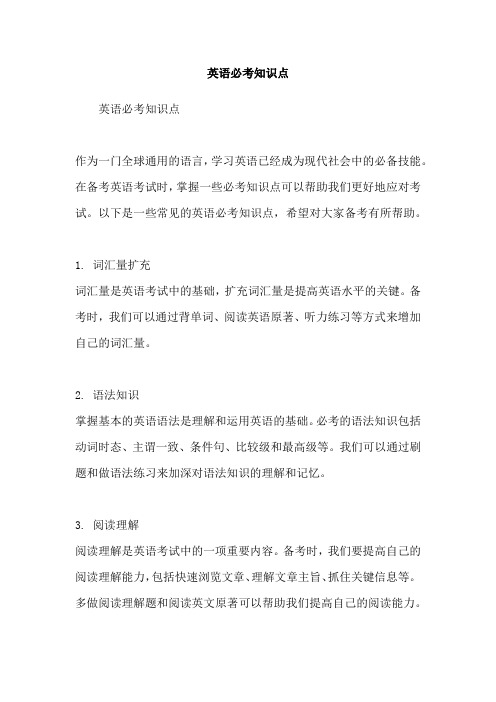
英语必考知识点英语必考知识点作为一门全球通用的语言,学习英语已经成为现代社会中的必备技能。
在备考英语考试时,掌握一些必考知识点可以帮助我们更好地应对考试。
以下是一些常见的英语必考知识点,希望对大家备考有所帮助。
1. 词汇量扩充词汇量是英语考试中的基础,扩充词汇量是提高英语水平的关键。
备考时,我们可以通过背单词、阅读英语原著、听力练习等方式来增加自己的词汇量。
2. 语法知识掌握基本的英语语法是理解和运用英语的基础。
必考的语法知识包括动词时态、主谓一致、条件句、比较级和最高级等。
我们可以通过刷题和做语法练习来加深对语法知识的理解和记忆。
3. 阅读理解阅读理解是英语考试中的一项重要内容。
备考时,我们要提高自己的阅读理解能力,包括快速浏览文章、理解文章主旨、抓住关键信息等。
多做阅读理解题和阅读英文原著可以帮助我们提高自己的阅读能力。
4. 写作技巧写作是英语考试中的一项重要内容,掌握一些写作技巧可以帮助我们提高写作水平。
备考时,我们要学会如何组织文章结构、使用适当的词汇和句型、注意语法和拼写错误等。
5. 听力技巧听力是英语考试中的一项重要内容,备考时我们要提高自己的听力技巧。
可以通过多听英语材料、做听力练习题、观看英语影视剧等方式来提高听力水平。
同时,注意提高自己的听力速度和听清楚关键信息的能力。
6. 口语表达口语是英语考试中的一项重要内容,备考时我们要提高自己的口语表达能力。
可以通过多与他人练习对话、参加口语角和模拟考试等方式来提高口语水平。
以上是一些英语必考知识点的简要介绍。
备考英语考试需要长期的积累和坚持,希望大家能够通过努力提高自己的英语水平,取得好成绩。
中考英语必考知识点

中考英语必考知识点一、词汇1.数字:数词、序数词、基数词、小数、分数等。
2.动词:时态、语态、非谓语动词(动词不定式、动名词、分词)、不规则动词等。
3.名词:单复数、可数不可数名词、所有格等。
4.形容词和副词:基本形容词和副词的比较级和最高级形式、形容词修饰的名词、副词修饰的动词、能够修饰形容词和副词的比较结构等。
5.连词:连词的种类、用法及连接词语的句子等。
6.代词:人称代词、指示代词、反身代词等。
7.冠词:冠词的种类、用法及其词组等。
8.介词:基本介词及其意义及用法、词组等。
9.情态动词:情态动词的种类、用法及其词组等。
10.疑问句:特殊疑问句、一般疑问句、选择疑问句等。
11.否定句:否定句的构成、否定词的位置等。
12.句子的基本成分:主语、谓语、宾语、表语、定语、状语等。
13.句型:陈述句、祈使句、感叹句、特殊疑问句、条件句、比较句等。
二、语法1.时态:一般现在时、一般过去时、一般将来时、现在进行时、过去进行时、将来进行时、现在完成时、过去完成时等。
2.语态:主动语态、被动语态。
3.非谓语动词:动词不定式、动名词、现在分词、过去分词的形式和用法。
4.名词性从句:主语从句、宾语从句、表语从句、同位语从句等。
5.定语从句:限制性定语从句、非限制性定语从句等。
6.状语从句:条件状语从句、时间状语从句、原因状语从句、方式状语从句、结果状语从句等。
7.并列句:并列句的连接及词组等。
8.书面表达:书信、应用文、记叙文、描写文、议论文、说明文等。
三、听力1.录音材料:记笔记、填空、选择等。
2.各种对话:日常交流、购物、问路、订酒店、预约、介绍、感叹等。
3.各种情景对话:图画、短文、故事等。
四、阅读理解4.夹叙夹议:根据短文内容综合归纳、评述、解释等。
五、写作1.书信:常见的书信格式、内容及写作要点等。
2.对话:场景对话、日常对话、情景对话等。
3.日记:时间、地点、人物、事件、感受等。
初中英语必考知识点全总结

初中英语必考知识点全总结一、词汇与短语1. 基础词汇:掌握初中阶段常用词汇,包括日常生活用品、颜色、数字、食物、动物、职业等。
2. 动词短语:了解并运用常见的动词短语,如look after, turn on, take off等。
3. 介词短语:掌握表示时间、地点、方式等的介词短语,例如in the morning, on the table, by bus等。
4. 形容词与副词:学会使用形容词描述事物,如big, small, quick 等,并了解副词的用法,如quickly, slowly等。
二、语法知识1. 时态:- 一般现在时:表示经常发生的动作或状态。
- 一般过去时:描述过去发生的动作或状态。
- 现在进行时:表达正在进行的动作。
- 过去进行时:描述过去某一时刻正在进行的动作。
- 一般将来时:表示将来会发生的动作或状态。
2. 语态:- 被动语态:强调动作的承受者。
- 常见被动语态结构:am/is/are + past participle。
3. 非谓语动词:- 动名词:作为名词使用,如swimming, reading等。
- 分词:现在分词和过去分词,用作形容词或副词。
4. 情态动词:表达可能性、能力、许可等,如can, may, must等。
5. 代词:了解人称代词、物主代词、反身代词、指示代词、疑问代词等的用法。
6. 连词:掌握并列连词和从属连词,用于连接句子或句子成分。
7. 句子结构:- 简单句:一个主语和一个谓语构成的句子。
- 并列句:用并列连词连接的两个或多个简单句。
- 复合句:包含主句和从句的句子结构。
8. 特殊句式:如倒装句、省略句等。
三、阅读理解1. 快速阅读:学会通过快速阅读抓住文章大意。
2. 精读:理解文章细节,包括生词、短语、句型等。
3. 推理判断:根据文章内容进行逻辑推理,做出合理判断。
4. 作者意图:识别作者的观点和写作目的。
四、写作技巧1. 句子构建:学会使用恰当的词汇和语法结构构建完整句子。
50个常考英语知识点总结

50个常考英语知识点总结1. Subject-Verb Agreement: Make sure the subject and verb agree in number (singular or plural).2. Pronouns: Ensure that pronouns agree with their antecedents in number and gender.3. Articles: Understand when to use "a," "an," and "the" before nouns.4. Tenses: Be familiar with the different verb tenses and when to use them.5. Prepositions: Know how to use prepositions correctly in different contexts.6. Adjectives and Adverbs: Recognize the difference between these two parts of speech and use them appropriately.7. Conjunctions: Understand how to use coordinating and subordinating conjunctions in sentences.8. Punctuation: Master the usage of commas, periods, apostrophes, quotation marks, and other punctuation marks.9. Capitalization: Know when to capitalize proper nouns and the first word in a sentence.10. Sentence Structure: Be able to construct and analyze simple, compound, complex, and compound-complex sentences.11. Direct and Indirect Speech: Understand how to report what someone said in both direct and indirect speech.12. Active and Passive Voice: Know when to use active and passive voice in writing and speaking.13. Conditional Sentences: Understand the different types of conditional sentences (zero, first, second, third) and how to use them.14. Modals: Be familiar with modal verbs and their various uses (e.g., can, could, may, might, must, should, would, etc.).15. Gerunds and Infinitives: Know when to use gerunds and infinitives as nouns or as part of verb phrases.16. Phrasal Verbs: Understand the meaning and usage of common phrasal verbs in English.17. Idioms: Know the meanings of common idiomatic expressions in English and how to use them in context.18. Homophones: Be able to differentiate between words that sound the same but have different meanings and spellings (e.g., their/there/they're, to/too/two).19. Homonyms: Understand the difference between words that are spelled the same but have different meanings (e.g., bear as in the animal and bear as in to carry).20. Synonyms and Antonyms: Recognize words with similar and opposite meanings and how to use them in writing and speaking.21. Homophones: These are words that sound the same but have different meanings and spellings.22. Homonyms: These are words that are spelled the same but have different meanings.23. Synonyms: These are words with similar meanings.24. Antonyms: These are words with opposite meanings.25. Comparative and Superlative Forms: Understand how to form and use comparative and superlative adjectives and adverbs.26. Degrees of Comparison: Learn the different degrees of comparison for adjectives and adverbs (positive, comparative, superlative).27. Irregular Verbs: Memorize the past tense and past participle forms of irregular verbs.28. Double Negatives: Avoid using double negatives in standard English.29. Homophones: Understand the difference between words that sound the same but have different meanings and spellings (e.g., their/there/they're, to/too/two).30. Sentence Fragments and Run-on Sentences: Recognize and avoid incomplete sentences and sentences that are too long and should be divided.31. Prepositional Phrases: Be able to recognize and use prepositional phrases in sentences.32. Clauses: Understand the different types of clauses: main, subordinate, and relative.33. Adjective and Adverb Clauses: Recognize and use these types of clauses to provide more detail about nouns and verbs.34. Possessive Forms: Know how to form possessives with nouns and pronouns.35. Direct and Indirect Objects: Understand the difference between direct and indirect objects in sentences.36. Dependent and Independent Clauses: Be able to identify and use these types of clauses in sentence construction.37. Active and Passive Voice: Know when to use active and passive voice in writing and speaking.38. Punctuation: Master the usage of commas, periods, apostrophes, quotation marks, and other punctuation marks.39. Capitalization: Know when to capitalize proper nouns and the first word in a sentence.40. Sentence Structure: Be able to construct and analyze simple, compound, complex, and compound-complex sentences.41. Direct and Indirect Speech: Understand how to report what someone said in both direct and indirect speech.42. Active and Passive Voice: Know when to use active and passive voice in writing and speaking.43. Conditional Sentences: Understand the different types of conditional sentences (zero, first, second, third) and how to use them.44. Modals: Be familiar with modal verbs and their various uses (e.g., can, could, may, might, must, should, would, etc.).45. Infinitives and Gerunds: Understand the difference between and the use of these two forms.46. Phrasal Verbs: Know the meaning and usage of common phrasal verbs in English.47. Idioms and Proverbs: Understand the meanings of common idiomatic expressions and proverbs in English and how to use them in context.48. Homophones: Understand the difference between words that sound the same but have different meanings and spellings (e.g., their/there/they're, to/too/two).49. Homonyms: Be able to differentiate between words that are spelled the same but have different meanings.50. Synonyms and Antonyms: Recognize words with similar and opposite meanings and how to use them in writing and speaking.Overall, understanding these 50 commonly tested knowledge points in English will help you become a more proficient and confident speaker and writer. If you can master these points, you will find that your English language skills will improve significantly.。
中考英语常考基础知识点

中考英语常考基础知识点第1个知识点————比较级和最高级第2个知识点————日期、星期、月份第3个知识点————单复数题第4个知识点————可数和不可数过去完成时则强调在“过去的过去”完成的动作或状态,通常用于描述在某个过去的动作或时间之前已经完成的事情。
它涉及两个过去的时间点,其中一个时间点早于另一个。
当我到达电影院时,电影已经开始了。
(When I arrived at the cinema ,the movie had already started.(这句话中,“到达电影院”是一个过去的动作,而“电影开始”是在这个动作之前发生的,属于“过去的过去”。
过去完成时用来描述这个更早发生的动作。
1、宾语从句:在复合句中作主句的宾语,连接词有that、if、whether、what、who、whom、which、where等。
宾语从句的语序必须是陈述语序。
I know that he is a teacher.Could you tell me where the nearest post office is2、主语从句:在复合句中作主句的主语,常见有that、whether、who、what 等。
What he said made me sad.(他说的话让我感到难过。
)Whether it will rain or not is still uncertain. 是否会下雨还不确定3、表语从句:在复合句中作主句的表语,位于系动词之后,The problem is what we should do next. (问题是我们接下来应该做什么。
)The truth is that he didn't tell the whole story. (事实是他没有说出全部真相。
)4、同位语从句:是对前面的名词进行解释说明的从句。
We have no idea when he will come back. (我们不知道他什么时候回来。
英语常考知识点

英语常考知识点英语作为一门重要的语言学科,在各类考试中都占据着重要的地位。
以下是一些常见的英语常考知识点,希望能对大家的学习有所帮助。
一、词汇词汇是英语学习的基础,也是考试中经常考查的内容。
1、同义词和近义词例如“big”“large”“huge”都有“大”的意思,但在使用上有细微的差别。
“big”比较常用,可修饰人、物等;“large”侧重于面积、范围的大;“huge”则强调体积的巨大。
再比如“happy”“glad”“pleased”都表达“高兴”,“happy”使用最广泛,“glad”常用于“be glad to do sth”的结构,“pleased”常与“with”搭配。
2、动词短语像“put on”(穿上)、“take off”(脱下)、“turn on”(打开)、“turn off”(关闭)等,要注意它们的含义和用法。
还有“look for”(寻找)、“find”(找到)、“look after”(照顾)等,要理解它们之间的区别。
3、形容词和副词的比较级和最高级规则变化,如“tall taller tallest”“nice nicer nicest”。
不规则变化,如“good better best”“bad worse worst”。
4、词汇的固定搭配“be interested in”(对感兴趣)、“be good at”(擅长)、“be afraid of”(害怕)等。
二、语法语法是英语学习的重点和难点,也是考试中的重要考查内容。
1、时态一般现在时:表示经常发生的动作或存在的状态,如“I play footba ll every day”一般过去时:表示过去发生的动作或存在的状态,如“He went to Beijing yesterday”一般将来时:表示将要发生的动作或存在的状态,如“She will come tomorrow”现在进行时:表示正在进行的动作,如“We are having a class now”过去进行时:表示过去某个时刻正在进行的动作,如“He was reading a book at eight last night”现在完成时:表示过去发生的动作对现在造成的影响或结果,如“I have finished my homework”2、语态主动语态和被动语态的转换,如“People grow rice in the south”(主动)“Rice is grown in the south”(被动)3、从句宾语从句:如“He said that he was a student”状语从句:时间状语从句(如“When I got home, my mother was cooking”)、条件状语从句(如“If it rains tomorrow, I won't go out”)、原因状语从句(如“Because he was ill, he didn't go to school”)等。
高三英语常考知识点有哪些?

高三英语常考知识点有哪些?高三英语常考知识点11. 定义:用作主语的从句叫做主语从句。
2. 构成:关联词+简单句3. 引导主语从句的关联词有三类:(1) 从属连词that。
如:That they were in truth sisters was clear from the facial resemblance between them.很明显,她们确是亲姐妹,她们的脸型很相似。
(2) 从属连词whether。
如:Whether he’ll e here isn’t clear. 他是否会来这里还不清楚。
(3) 连接代词who, whom, whose, what, which, whoever, whatever, whichever连接副词 where, when, how, why。
如:What she did is not yet known. 她干了什么尚不清楚。
How this happened is not clear to anyone. 这事怎样发生的,谁也不清楚。
Whoever es is wele. 不论谁来都欢迎。
Wherever you are is my home ---- my only home. 你所在的任何地方就是我的家----我的家。
解释:1. 主语从句能用it作形式上的主语。
常以it作形式主语的句型有:A. It+be+形容词(obvious, true, natural, surprising, good, wonderful, funny, possible, likely, certain, probable, etc.)+that从句。
如:It is certain that she will do well in her exam. 毫无疑问她考试成绩会很好。
It is probable that he told her everything. 很可能他把一切都告诉她了。
史上最全!278个英语常考知识点总结-赶快收藏!

史上最全!278个英语常考知识点总结,赶快收藏!1 see、hear 、notice 、find 、feel 、listen to 、look at (感官动词)+do eg:I like watching monkeys jump2(比较级and 比较级) 表示越来越怎么样3 a piece of cake =easy 小菜一碟(容易)4 agree with sb 赞成某人5 all kinds of 各种各样a kind of 一样6 all over the world = the whole world 整个世界7 along with同……一道,伴随……eg : Iwill go along with you我将和你一起去the students planted trees along with their teachers 学生同老师们一起种树8 As soon as 一怎么样就怎么样9 as you can see 你是知道的10 ask for ……求助向…要…(直接接想要的东西) eg : ask you for my book11 ask sb for sth 向某人什么12 ask sb to do sth 询问某人某事ask sb not to do 叫某人不要做某事13 at the age of 在……岁时eg:I am sixteen I am at the age of sixteen14 at the beginning of …………的起初;……的开始15 at the end of +地点/+时间最后;尽头;末尾eg : At the end of the day16 at this time of year 在每年的这个时候17 be /feel confident of sth /that clause +从句感觉/对什么有信心,自信eg : I am / feel confident of my spoken English I feel that I can pass the test18 be + doing 表:1 现在进行时2 将来时19 be able to (+ v 原) = can (+ v 原) 能够……eg : She is able to sing She can sing20 be able to do sth 能够干什么eg :she is able to sing21 be afraid to do (of sth 恐惧,害怕……eg : I’m afraed togo out at night I’m afraid of dog22 be allowed to do 被允许做什么eg: I’m allowed to watch TV 我被允许看电视I should be allowedto watch TV 我应该被允许看电视23 be angry with sb 生某人的气eg : Don’t be angry with me24 be angry with(at) sb for doing sth 为什么而生某人的气25 be as…原级…as 和什么一样eg : Sheis as tall as me 她和我一样高26 be ashamed to27 be away from 远离28 be away from 从……离开29 be bad for 对什么有害eg : Reading books in the sun isbad for your eyes 在太阳下看书对你的眼睛不好30 be born 出生于31 be busy doing sth 忙于做什么事be busy with sth 忙于……32 be careful 留神;小心33 be different from……和什么不一样34 be famous for 以……著名35 befriendly to sb 对某人友好36 be from = come from 来自eg :Heis from Bejing He comes from Bejing Is he from Bejing ? Does he come fromBejing ?37 be full of 装满……的be filledwith 充满eg: the glass is full of water the glass isfilled with water38 be glad+to+do/从句39 be going to + v(原) 将来时40 be good at(+doing) = do well in 在某方面善长, 善于……41 be good for 对什么有好处eg : Reading aloud is good foryour English42 be happy to do 很高兴做某事43 be helpful to sb 对某人有好处eg : Reading aloud is helpful to you 大声朗读对你有好处Exercising is helpful to your bady 锻炼对你的身体有好处44 be in good health 身体健康45 be in trouble 处于困难中eg : She is in trouble They arein tronble46 be interested in 对某方面感兴趣47 be late for = come late to 迟到eg: Be late for class 上课迟到48 be like 像……eg : I’m like my mother49 be mad at 生某人的气50 be made from 由……制成(制成以后看不见原材料)51 be made of 由……制成(制成以后还看得见原材料)52 be not sure 表不确定53 be on a visit to 参观54 be popular with sb 受某人欢送55 be quiet 安静56 be short for 表**的缩写eg: 陶is shortfor 陶俊杰57 be sick in bed 生病在床58 be sorry to do sth be sorryfor sb eg : I am sorry for you59 be sorry to hear that60 be sorry to trouble sb eg : I am sorry to troubleyou61 be strict in doing sth 严于做某事eg : He’s strict inobeying noles62 be strict with sb 对某人要求严格eg: Some students are notstrict with them selves 这些学生对自己不严格63 be strict with sb in sth 某方面对某人严格64 be supposed todo 被要求干什么65 be sure 表确定66 be sure of doing sth 对做某事有信心eg: He is sure of winning I am sure of learning English well67 be sure of sth 对做某事有信心eg: I’m sure of my head (myteacher 我相信我的大脑(老师)68 be sure that sth 对做某事有信心eg: I’m suer that he canpass the test 我相信他能通过考试69 be sure to do sth一定会做某事eg: We are sure to pass thetest 我们一定会通过这次考试We are sure to learn English well 我们一定能学好英语70 be terrified of + 名/动doing 害怕……71 be terrified to do sth 害怕做某事72 be the same as …和什么一样73 be used to doing sth 习惯做某事eg: My father is used to getting up early 我爸爸习惯早He isused to sleeping in class 他习惯上课睡觉74 be worth doing 值得做什么75 be(feel) afraid to do sth 害怕做某事be afraid of sth 害怕某物be afraid that 丛句76 because+句子because of +短语eg : He was late because he had a headache He was late because of his headache77 begin to do = start to do 开始做某事start…with…=begin…with…以什么开始什么eg : Let’s begin the game with the song I begin to go home78 between…and…两者之间79 borrow sth from sb 向……借……lend sth to sb ( lend sb sth 借给……什么东西eg : I borrowed a pen from him he lent a pen to me ( he lent me a pen80 both = the same(as) = not different(from) 表相同81 bother 打搅bother sb to do sth eg : I’m sorry to bother you ,but can you tell me to way to the station 我十分抱歉打搅你,但是你能告诉我怎么去车站the problem has been bothering me for weeks 这个问题困扰了我几个周了He’s bothering me to lend him money82 by the end of 到……为止83 callsb sth eg : We call him old wang84 care 关心eg : Don’t you care about this country’s future ?你为什么不关心国家的未来85 catch up with sb 赶上某人86 chat with sb 和某人闲谈take sb to + 地点带某人去某地87 come in 进88 come over to 过来89 come up with 提出eg: Can you come up with a good idea你能想出一个好方法吗?90 communicate with sb 和某人交流91 consider + doing 考虑做什么eg : Why not consider going to lu zhou 为什么不考虑去泸州?92 dance to 随着……跳舞eg : Shelikes dancing to the music 她喜欢随着音乐跳舞93 decide to do sth 决定做某事94 do a survey of 做某方面的调查95 do better in 在……方面做得更好96 do wrong 做错97 Don’t forget to do sth 不要忘了做某事98 Don’t mind +doing /从句/名词不要介意……99 each +名(单)每一个…eg : Each student has many books 每一个学生都有一些书100 end up +doing101 enjoy +doing喜欢102 escape from 从……逃跑eg: Theprisoners have escaped from the prison犯人从监狱里逃跑出来103 expect to do sth 期待做某事104 fall down 摔下来fall off 从哪摔下来105 fall in love with sb/sth 爱上什么106 far from 离某地远eg : The school is far from my home107 find +it +adj +to do 发现做某事怎么样108 find sb/sth +adj 发现什么怎么样eg : I find the bookinteresting109 finish 完成+doing(名词)110 fit to sb = be fit for sb 适合某人111 forget to do 没有做而忘了forget doing 做了而又忘了eg: Don't forget to gohome I forget closing door112 from…to…从某某到某某eg: Fromme for her113 get /have sth down 做完,被(别人)做…eg: I have my hair cut我理了发(头发被剪了) Tom got his bad tooth pulled out 汤母把他的坏牙拔掉了(被牙医拔掉了)114 get a part-time job= find a part-time job115 get along well with sb = geton well with sb 与某人相处得好116 get along with sb = get on with sb 与某人相处117 getready for = be ready for为什么而准备eg : I get ready for mathI am ready for math118 get sb in to trouble 给某人麻烦119 get sb to do sth120 get…from…从某处得到某物121 give a talk 做报告eg: He is give a tall122 give sth to sb give sb sth 给某人某物123 go fish 钓鱼go swimming 游泳124 go on to do 去做下一件事go on doing 继续做这件事125 go out away from go out of126 go to school 上学(用于专业的)go to the school 去学校(不一定是上学)127 good way to 好方法128 hate to do 讨厌没做过的事hate doing 讨厌做过的事129 have a party for sb 举办谁的晚会130 have a talk 听报告谈一谈131 have been doing 现在完成进行时eg : You have been talkingYou have been sleeping since132 have been to …( 地方)……去过某过地方have gone to …(地方) 去了某地还没回来133 have fun +doing 玩得高兴134 have sth to do 有什么事要做eg: I have a lot of homework to do 我有很多家庭作业要做I havenothing to do 我没什么事情做135 have to do sth 必须做某事136 have trouble (problem) (in) doing sth 做什么事情有麻烦137 have…time +doing138 have…(时间)…off 放……假eg: I have month off 我请一个月得假139 hear sb +do/doing 听见某人做某事/正在做某事140 help a lot 很大用处141 help sb with sth \one’s sth 帮助某人某事(某方面) help sb(to) do sth 帮助某人做某事142 hope to do sth 希望做某事143 How about(+doing) = What about(+doing)144 how do you like = what do you think of 你对什么的看法145 if : 是否=wether eg: I don’t know if (wether) I should go to the party 我不知道我是否应该去参加晚会He don't know if (wether) we will arrive on time tomorrow morning 他不知道我们明天早上是否能准时到达146 if :如果,假设(全部接一般时态)+条件语态从句eg: I’ll go to LuZhou if it does’t rain 假设明天不下雨,我就去泸州If they change the plan they will let me know 假设他们要改变计划,他们会让我知道的I'll go to England ,if I have enough money next year 如果我明年由足够的钱,我就要去英国147 in one's opinion = sb think 某人认为148 in some ways 在某些方面149 in the end = finally(adv) 最后150 in the north of…什么在什么的北方(north 北sowth 南west 西east东)151 in the sun 在太阳下152 increase 增加eg : They’ve increased the prece of petrol by 3% 他们把石油价增加了3% the population has increased from 12 million ten years ago to 18 million now 153 instead of +(名) 代替eg: I’d like an apple instead of a pear 我想要苹果,而不要梨子I like English instead of math 我喜欢英语而不喜欢数学154 introduce sb to sb 介绍某人给某人introduce oneself 自我介绍155 invite sb to do sth 邀请某人做某事156 It takes sb sometime to do sth 做某人花掉某人多少时间eg : It took me 5 minutes to do my homework It takes me half an hour to cook157 It's +adj +for sb to do sth 对某人来说做某事怎么样158 It's +adj +to do 做某事怎么样159 It's +adj for sb 对于某人来说怎么样It's +adj of sb 对某人来说太怎么样160 It's +adj(for sb) to do(对某人来说) 做某事怎么样It's +adj ofsb to do sth 对某人来说做某事太怎么样eg : It's nice of you to help me with my English161 It's a good idea for sb to do sth 对……来说是个好主意162 It's important to sb 对某人来说很重要eg: It's important tome163 It's time to do sth It’s time for sth 到了该去做某事的时间eg : It's time to have class It’s time for class 该去上课了164 join = take part in 参加165 just now 刚刚166 keep +sb /sth +adj /介词短语让什么保持什么样?167 keep out 不让……进入168 keep sb adj 让……保持……eg: Iwant to keep my mother happy keep healthy 保持健康169 key to +名词表示:某物的钥匙或某题的答案170 key to…anser to …key 可以是答题或钥匙171 laugh at…取笑……eg : Don't langh at others Welanghed at the joke172 learn by oneslfe 自学173 learn from sb 向某人学习eg: We should learn from LeiFeng174 learn to do sth 学做某事175 let sb do sth 让某人做某事176 Let sb down 让某人失望eg :Weshouldn't let our farents down 我们不应该让我们的父母失望177 live from :离某地远178 live in +大地方/at +小地方居住在某地eg: I live in LuZhou She lives at XuanTan 179 look after = take care of 照顾照看180 lose one's way 谁迷路eg : Lose your way 你迷路181 make a decision to do sth 决定做某事182 make friends with sb 和谁成为朋友eg : I want to makefriends with you183 make it early 把时间定的早一点184 make on exhibition of oneself 让某人出洋相185 make sb /n +n 使什么成为什么eg : I made her my stepmoller I made you my wife 186 make sb /sth +adj 使某人(某物)怎么样eg : You must madeyour bed clean187 make sb /sth adj 使某人/某物怎么样188 make sb do sth 让某人做某事eg : I made him write 我以前让他写189 make up be made up of (被动语态)由……组成190 make…difference to…191 mind sb to do mind one's doing 介意……做什么192 most +名most of +代193 much too +形容词194 must be 一定195 need +名词196 need sb do sth 需要某人做某事197 need to do (实义动词) need do (情态动词)198 no /neithr of hate to do no /neithr of hate doing199 no +名词200 not anymore = no more 再也不……eg: He didn't cry anymore He cried no more 他再也不哭201 not…(形、副)at all eg: He’s not tall at all she doesn't junp far at all202 not…at all 一点都不203 not…either 表否认,也不eg : I don't japanse either Idon't have sister, either 我也没有姐姐204 not…until 直到……才……eg: I didn't sleep until my mother came back The child didn't stop crying untilI give her sugar205 offer / provide sb with sth 给某人提供206 offer sb sth ( offer sth to sb 提供什么东西给某人eg : Ioffer you water (I offer water to you 我给你提供水207 on one's way to…在谁去那的路上208 on the one hand 一方面on the other hand 另一方面209 on the phone = over the phone 用交谈210 on time 准时in time 及时211 one day =some day =someday 一天,有一天212 one of +可数名词的复数形式213 one to another 一个到另一个214 over and over again 一遍又一遍215 say to oneself 对自己说216 please +do217 please hepl yourself218 part-time job 兼职工作full-time job全职工作219 please with sb.220 pool into = pore into221 practice +doing222 prefer sth.to sth. 相对... 更喜欢223 pay for224 rather ...than 宁可....也不225 regard ... as 把.... 当作226 remind sb. about sth.227 remind sb. of sth.228 return sth. to sb.229 pretend to do sth. 装着去做什么230 say to sb. 对某人说231 sb. spend some money on sth. 花了多少钱在某事上232 sb. spend sometime with sb. 花了多少时间陪谁233 sb. spend sometime (in) doing sth.234 sb. with sb. +is sb and sb +are235 see sb do236 seem to do/be +adj. 显得怎么样238 send ...to ...239 shock 使... 震惊240 show sb sth241 show sb sth =show sth to sb242 show sth to sb243 some ... others 一些... 另一些244 start .. with... begin ...with..245 stay away from 远离246 stop doing 停下正在做的事247 stop to do sth 停下来正在做的事去做下一件事248 stop sb from doing sth 阻止某人做某事249 stop sb(from)dong 阻止某人做某事250 such +名251 suit sb 适合某人252 surprise sb253 take classes254 take sb to255 take walks=take a walk= go for a walk256 talk to257 talk of258 talk with sb260 tell sb not to do sth261 tell a lie262 teach sb sth263 tell ... from..264 thank you for doing265 the same +名词(doing)+as...266 the same ...(名)...as267 the way to do sth=the way of doing sth268 the way to ...(地点)269 too.. to270 transalte ... into...271 travel with sb272 try to do sth 想干什么但没成功try doing sth 想干什么,已经做过了273 try one's best to do sth 尽某人最大的努力274 try ... 试衣服have a try 试一下275 turn down 开小turn up 开大276 turn off 关上turn on 打开277 upsidde down 倒着278 visit to 参观某个地方。
英语知识点归纳
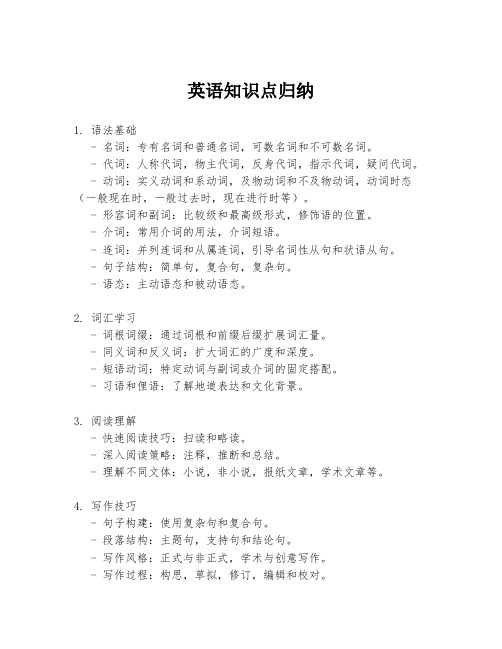
英语知识点归纳1. 语法基础- 名词:专有名词和普通名词,可数名词和不可数名词。
- 代词:人称代词,物主代词,反身代词,指示代词,疑问代词。
- 动词:实义动词和系动词,及物动词和不及物动词,动词时态(一般现在时,一般过去时,现在进行时等)。
- 形容词和副词:比较级和最高级形式,修饰语的位置。
- 介词:常用介词的用法,介词短语。
- 连词:并列连词和从属连词,引导名词性从句和状语从句。
- 句子结构:简单句,复合句,复杂句。
- 语态:主动语态和被动语态。
2. 词汇学习- 词根词缀:通过词根和前缀后缀扩展词汇量。
- 同义词和反义词:扩大词汇的广度和深度。
- 短语动词:特定动词与副词或介词的固定搭配。
- 习语和俚语:了解地道表达和文化背景。
3. 阅读理解- 快速阅读技巧:扫读和略读。
- 深入阅读策略:注释,推断和总结。
- 理解不同文体:小说,非小说,报纸文章,学术文章等。
4. 写作技巧- 句子构建:使用复杂句和复合句。
- 段落结构:主题句,支持句和结论句。
- 写作风格:正式与非正式,学术与创意写作。
- 写作过程:构思,草拟,修订,编辑和校对。
5. 听力理解- 听力技巧:预测,归纳,捕捉关键信息。
- 口音识别:熟悉不同英语口音的特点。
- 听力材料:电影,电视节目,播客,讲座等。
6. 口语表达- 发音练习:元音和辅音的正确发音,语音和语调。
- 流利度提升:使用连接词和过渡短语。
- 口语策略:如何描述,叙述,讨论和辩论。
- 面试和演讲:准备和表达技巧。
7. 学习策略- 目标设定:短期和长期的学习目标。
- 时间管理:有效规划学习时间和休息时间。
- 资源利用:教材,在线课程,语言交换伙伴等。
- 自我评估:定期检查学习进度和调整策略。
8. 文化知识- 英语国家文化:习俗,节日,历史和社会特点。
- 文学作品:经典和现代文学作品的阅读和理解。
- 跨文化交流:文化差异的认识和尊重。
9. 考试准备- 常见英语考试:TOEFL,IELTS,GRE,GMAT等。
- 1、下载文档前请自行甄别文档内容的完整性,平台不提供额外的编辑、内容补充、找答案等附加服务。
- 2、"仅部分预览"的文档,不可在线预览部分如存在完整性等问题,可反馈申请退款(可完整预览的文档不适用该条件!)。
- 3、如文档侵犯您的权益,请联系客服反馈,我们会尽快为您处理(人工客服工作时间:9:00-18:30)。
英语常考知识点
作为一门重要的国际语言,英语在全球范围内被广泛使用。
无论是在学习、工作还是生活中,英语都扮演着非常重要的角色。
因此,对于英语常考知识点的了解和掌握,对于我们提高英语水平、实现跨国交流和拓展国际视野都非常有益。
本文将详细介绍英语常考知识点,帮助读者系统地掌握英语语法、词汇、听力等方面的知识。
一、英语语法
英语语法是英语学习中非常重要的一个部分,它涉及到句子的结构、语法规则等方面。
在英语语法中,最基本的句型是主语+谓语+宾语。
除此之外,还有一些常用的句型,如倒装句、祈使句、被动语态等。
下面将详细介绍一些英语常考语法知识点。
1. 主谓一致
主语和谓语在时态、人称、单复数等方面必须保持一致。
例如,当主语为第三人称单数时,谓语动词要用单数形式,如:He plays football every day. 当主语为第三人称复数时,谓语动
词要用复数形式,如:They play football every day.
2. 名词性从句
名词性从句是指在复合句中充当名词的从句。
常见的名词性从句有主语从句、宾语从句、表语从句、同位语从句等。
例如:I don't know what he is doing. (what引导的是宾语从句)
3. 状语从句
状语从句是修饰句子中的谓语动词、形容词、副词等成分的从句。
常见的状语从句有时间状语从句、条件状语从句、原因状语从句、结果状语从句等。
例如:If I have time, I will go to the cinema. (if引导的是条件状语从句)
4. 介词短语
介词短语是由介词及其宾语构成的常用短语。
介词短语通常在句子中作状语、定语或补语等,用来表示时间、地点、方式、原因、目的等。
例如:She arrived at the station on time. (at the station是介词短语,作时间状语)
5. 动词时态和语态
英语动词的时态包括一般现在时、一般过去时、现在进行时、过去进行时、一般将来时、过去将来时等。
动词语态包括主动语态和被动语态。
例如:He is playing basketball now. (现
在进行时) The book was written by Tom last year. (被动语态)
二、英语词汇
英语词汇是英语学习中不可或缺的一部分,因为它与语法、听力、阅读和写作紧密相连。
掌握一定的英语词汇量是提高英语水平的前提。
下面是几个常见的英语词汇知识点。
1. 同义词和反义词
同义词是指意义相近或相同的词语,如happy和pleased;反义词是相反意义的词语,如hot和cold。
熟练掌握同义词和
反义词可以让我们更准确地表达自己的意思。
2. 词根、前缀和后缀
英语单词的构词方式通常包括词根、前缀和后缀。
词根是单词的核心部分,具有基本意义和词源信息。
前缀和后缀可以改变词根的意义,使单词更具表现力。
例如:un-、dis-、mis-
等是常见的前缀;-ly、-ment、-ful等是常见的后缀。
3. 冠词、代词和连词
冠词、代词和连词是英语中常见的虚词。
冠词包括定冠词the和不定冠词a/an;代词可以代替名词或名词短语来使用,
分为人称代词、指示代词、疑问代词、不定代词、相对代词等;连词用来连接句子或句子成分,主要有并列连词、从属连词、关联副词等。
4. 近义词辨析
在英语中,有些单词之间非常相似,造成很多人的混淆。
例如:choose和pick、lend和borrow、advice和advise等。
熟练掌握这些词的用法,可以避免我们在交流中犯错。
三、英语听力
英语听力是英语学习的重要方面之一。
它不仅可以让我们更好地理解外语世界,也能帮助我们在日常交流中更加自如地表达自己。
下面是几个常见的英语听力知识点。
1. 音标和发音
正确的发音是听力的基础,而音标则是学习和记忆发音的重要工具。
英语中共有44个音素,其中包括20个元音和24个辅音。
熟练掌握这些音素的发音和对应的音标,可以帮助我们更准确地模仿和纠正发音。
2. 常见缩略语和俚语
英语中有很多常见的缩略语和俚语,例如:TBH (to be honest)、BTW (by the way)、ROFL (rolling on the floor laughing)等。
熟练掌握这些缩略语和俚语的含义可以帮助我们更好地理解和交流。
3. 对话和听力理解
在日常生活中,我们会遇到很多的对话。
熟练掌握对话中的表达方式、语言习惯和交际技巧,对我们听力的提高也非常有帮助。
在听对话时,需要注意其背景和语境,理解对话双方的意图和内容,从而更加准确地理解对话。
四、英语阅读
英语阅读是英语学习的重要组成部分。
它不仅有助于我们学习英语知识,还可以提高我们的阅读技巧和逻辑思维能力。
下面是几个常见的英语阅读知识点。
1. 阅读速度和理解
阅读速度和理解是英语阅读中的两个重要方面。
快速阅读可以帮助我们更好地把握文章的主要内容和思路,而对于一些难度较高的文章,需要仔细阅读才能理解。
因此,在英语阅读中,需要平衡阅读速度和理解能力,培养良好的阅读习惯。
2. 词汇和语法
英语阅读中的词汇和语法至关重要。
如果我们不熟悉阅读中的词汇和语法,就会难以理解文章的意思。
因此,我们需要熟练掌握英语的基本语法,扩大自己的词汇量,巩固基本英语能力。
3. 阅读技巧和策略
在英语阅读中,有很多阅读技巧和策略可以帮助我们更好地理解文章。
例如,可以先浏览文章,找出文章的主旨和结构;在阅读文章时可以做笔记和标记,帮助自己更好地掌握文章中的信息;还可以通过纵向比较和横向比较等方式理解文章。
五、英语写作
英语写作是英语学习中的重要组成部分。
良好的英语写作能力可以帮助我们更好地表达自己的思想和观点,提高我们的交流能力。
下面是几个常见的英语写作知识点。
1. 基本句型和连词
基本的英语句型是主语+谓语+宾语,但在写作中也需要使用一些复杂的句型,如并列句、复合句、定语从句等。
连词是链接句子和句子成分的重要手段,有关键词词组连词、复合词连词、从属词连词等。
熟练运用这些句型和连词可以使我们的文章更加准确、连贯和具有说服力。
2. 词汇和语法
写作中的词汇和语法也很重要。
正确使用单词和语法可以使文章更加清晰、简洁和易读。
因此,我们需要掌握正确的语法结构和用法,积累丰富的词汇量以及常见的表达方式。
3. 文章结构和段落分明
一篇好的英语文章需要具有清晰的结构和段落分明的特点。
文章的开头要具有吸引力,引起读者的兴趣;正文中要有明确的论点和合理的论证,体现思路的连贯和条理性;结尾要给读者留下深刻印象并强调重点。
总结
英语常考知识点包括英语语法、词汇、听力、阅读和写作等方面,它们密切相关且相互依存。
熟练掌握这些知识点可以帮助我们更好地学习和使用英语,提高英语能力,拓展国际视野,更好地走向世界。
因此,我们要注重细节,学以致用,不断提高自己的英语水平。
